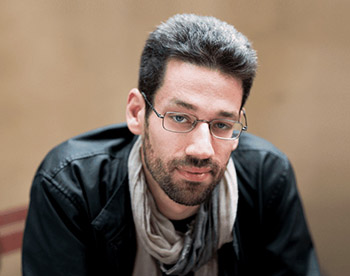On Saturday at 2 pm and Sunday at 3:30, The Cleveland Opera presents “Mozart, Still, and Christmas” a one-hour, costumed, semi-staged concert at Kent’s Faith Lutheran Church (Saturday) and Cleveland’s St. Casimir Church (Sunday).
And on Sunday at 4 pm, Church of the Western Reserve Concert Series presents the Acadia Trio in piano trios by Robert Schumann and Felix Mendelssohn.
For details of upcoming events, visit our Concert Listings.
INTERESTING READ:
In a New York Times guest essay published on December 28, pianist Jonathan Biss (pictured) discusses Franz Schubert’s last three piano sonatas, written in 1828, just two months before the composer died. Read “Schubert Is the Best Cure I Know for Loneliness” here, and don’t skip the reader comments.
WEEKEND ALMANAC by Jarrett Hoffman
January 4:
On this date in 1950, the Radio Corporation of America (RCA) announced that it would produce LPs — 33 1/3 rpm long playing records — following the lead established by Columbia Records in 1948.
These records would replace 78 rpm discs — made of an abrasive shellac compound and limited to about five minutes of recording time per side — with vinyl, and formerly wide grooves with “microgrooves,” extending playing time to 22 minutes per side.
The history of this development gets a bit complicated (RCA had attempted to bring out an earlier version in 1931 that failed), but suffice to say that the change from shellac to vinyl — with all the attendant technical details — was a boon for classical music.
RCA has produced two films about “The History of Vinyl.” Click here to watch a 1946 film narrated by longtime Metropolitan Opera commentator Milton Cross that includes a tour of RCA’s Camden, New Jersey plant, and here to watch Part II, which followed ten years later. Part III, which came along in 1958, introduced stereo recording.
January 5:
Pierre Boulez, who died on this date in 2016, is considered one of the most — if not the most — important figures in classical music from the latter half of the 20th century. That reputation derives from all aspects of his work: composer, conductor, writer, and administrator.
Contained under that large umbrella is a decades-long relationship with The Cleveland Orchestra: his American professional debut at Severance Hall in 1965 led to more than 220 concerts with the Orchestra. He became its first principal guest conductor in 1969, served as musical advisor for two seasons after the death of George Szell in 1970, and made many recordings with the Orchestra, including five that received Grammy Awards.
Longtime principal keyboardist Joela Jones memorably described his personality in an interview in 2015 with Mike Telin, as the Orchestra prepared to celebrate Boulez’s 90th birthday: “…to me it’s amazing that somebody who is so great, so brilliant, and so gifted, could also be so humble and modest. He just makes you feel so comfortable, like you are his equal, which of course you’re not. And, if you have enough intelligence you know that.”
In a second interview with Telin, this one from last year when Jones was making her final appearance with the Orchestra as principal keyboardist, she commented on another important aspect of who Boulez was: a champion of contemporary music. “He did not want music to become a museum of old composers, and a lot of music has forged ahead because of his forceful personality.”
To celebrate Boulez on this occasion, we’ll suggest a piece that comes with its own ties to this date in history. That would be his Second Piano Sonata, a favorite of Italian pianist Maurizio Pollini, who was also born on this date in 1942 (he died last March) and who recorded the Sonata in the ‘70s for Deutsche Grammophon.
Tom Service describes it well in an essay for The Guardian. “…I remember putting on the Boulez for the first time and experiencing a visceral shock that music — and the piano — could make sounds as violent, as volcanic, as this…In the sonata’s four movements, you hear the music tearing at the seams of classical and serial structure, as the 23-year-old Boulez tries to find a language that will exorcise the ghosts of classical music, from Bach to Schoenberg.”
Listen to that recording here.




